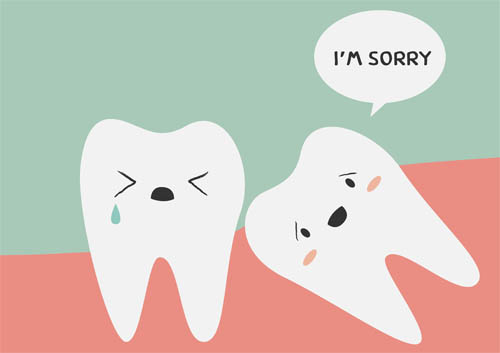Why You Should Have Your Wisdom Teeth Removed
March 20th, 2024

It’s human nature to delay tackling problems. We even have the clichés to prove it: “Leave well enough alone.” “Out of sight, out of mind.” “If it’s not broken, don’t fix it!” But when it comes to your health, proactive care is always best. And when it comes to dental health, your wisdom teeth are certainly something to be proactive about!
Children have 20 baby teeth that are replaced over time with 32 adult teeth. The last to arrive, in our late teens and early twenties, are the four third molars, or wisdom teeth. But that “32” total is a little flexible. Some people never develop wisdom teeth at all. You can stop reading here if you are one of this carefree group. The rest of us have from one to four wisdom teeth, and it’s a smart idea to ask our dental professionals just what we have going on below the gumline.
Your dentist might be the first to mention your wisdom teeth at your regular checkup, or you might be surprised to see a new tooth emerging while you are doing your nightly brushing and flossing. Wisdom teeth can remain trapped under gums and bone, a condition called “impaction,” they can erupt partially, or sometimes even erupt completely. They can be symptom-free, or may present with pain, redness, swelling, or bad breath. But whenever the first signs of wisdom teeth appear, in an X-ray or in your mirror, it’s time to discuss your options.
Completely Impacted Tooth
A wisdom tooth may never erupt, remaining trapped below your gums because it has no room to emerge. Even though it isn’t visible, an impacted wisdom tooth can pose serious risks requiring its extraction:
- Other teeth might be pushed out of alignment as the tooth tries to emerge
- The roots of neighboring teeth can be damaged by pressure from the trapped tooth
- A cyst can develop around the impacted tooth which can damage neighboring teeth, nerves, and bone
- Rarely, a tumor can develop. While these are usually benign, they can require the removal of bone and tissue.
Even if you are symptom-free, regular exams and X-rays are important for monitoring the condition of impacted wisdom teeth to make sure that they remain problem-free.
Partially Impacted Tooth
A wisdom tooth can also begin to erupt, but never break completely through the gums. The partially exposed tooth and the gum tissue are very difficult to clean effectively, trapping food particles and bacteria. Partially erupted teeth:
- Have a greater chance of serious decay
- Increase the risk of gum disease
- Can also cause problems as they emerge when they are angled toward neighboring teeth.
When infection and rapid decay are present, or the tooth is emerging at an angle which can damage nearby teeth or bone, extraction is often considered the best treatment option.
Preventive Extraction
Some people have enough room in their mouths to accommodate wisdom teeth without affecting the alignment of their other teeth or their bite. Some wisdom teeth never erupt at all, staying within the jawbone without affecting other teeth. If there are no problems with these teeth, your dentist and oral surgeon might recommend leaving them in place and monitoring them carefully.
If there is the potential for crowding, damage to nearby teeth, or any other future problems, extraction could be recommended as a preventative measure. Age can be an important factor in recommending extraction as well. Patients in their late teens and early twenties often have an easier time with wisdom tooth surgery because:
- The roots of the wisdom tooth aren’t as developed
- Jawbone structure is not as dense
- Shorter roots aren’t as likely to impact sinuses in the upper jaw
- Shorter roots are less likely to cause interference with nerves in the lower jaw
- Bone healing and regeneration is more efficient at this age.
If you are considering the best plan of action for your wisdom teeth, an appointment with Dr. Mazock, Dr. Salazar, and Dr. Coleman at our San Antonio or Castroville office is a very good idea. Oral and maxillofacial surgeons have a minimum of four years of advanced studies in a hospital-based residency program, where they train with medical residents in the fields of general surgery, anesthesiology, internal medicine, and other specialties with a specific focus on the bones, muscles, and nerves of the face, mouth, and jaw.
Oral surgeons like Dr. Mazock, Dr. Salazar, and Dr. Coleman are experts in dealing with wisdom teeth and surgical extractions. And while most extractions are fairly straightforward, their surgical training and experience is invaluable where extractions are more complicated due to the position of the tooth in the jaw, the degree of impaction, and the length and development of the roots. They are trained in all forms of anesthesia, and can provide whichever method you choose for your most comfortable experience, whether it be local anesthesia, sedation, or general anesthesia.
When you’re dealing with your health, the only cliché that really applies is “An ounce of prevention is worth a pound of cure”! Whether your wisdom teeth are best treated with extraction or regular monitoring, Dr. Mazock, Dr. Salazar, and Dr. Coleman can help you decide on the best plan for your dental health both today and for your future.





 Website
Powered by Sesame 24-7™
Website
Powered by Sesame 24-7™